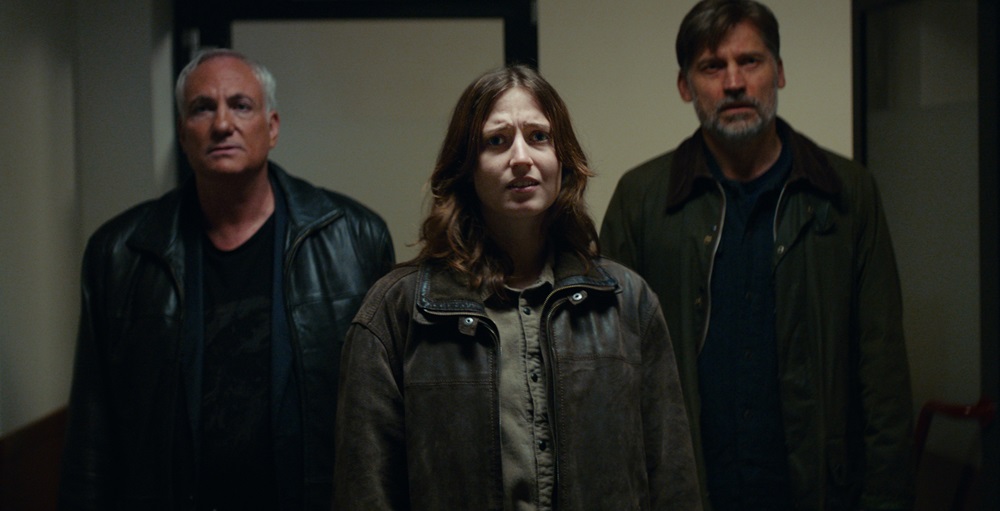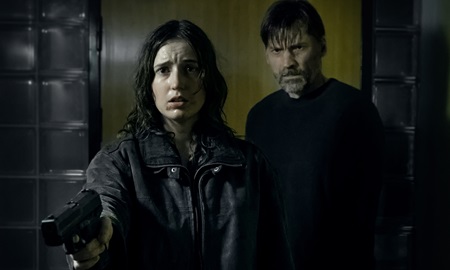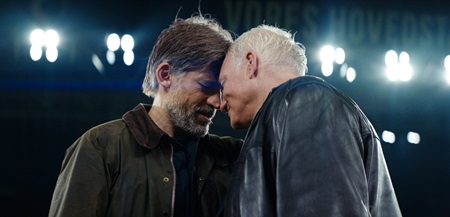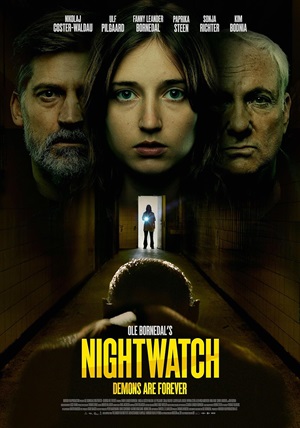
Nightwatch: Demons Are Forever (2023)
by Sara Michelle Fetters - May 24th, 2024 - Movie Reviews
A Demonic Killer Returns to Scalp Terror in Nightwatch Sequel
Nightwatch: Demons Are Forever might be the most unexpected “legacy sequel” to ever hit screens. Writer-director Ole Bornedal returns to the world of his influential 1994 thriller Nightwatch — which he (with a gentle assist from Steven Soderbergh) remade in 1997 with a fresh-faced Ewan McGregor in the lead role — and reunites core members of the original cast (Nikolaj Coster-Waldau, Kim Bodnia, and Ulf Pilgaard) to assist him. His daughter, the exceptionally talented Fanny Leander Bornedal, comes along for the ride as well.
Set 30 years after the events of the previous story, medical student Emma (Bornedal) is obsessed with helping her grieving father Martin (Coster-Waldau) get over the death of her mother Kalinka seven years prior. When they were in college, her parents were almost murdered by notorious serial killer Wörmer (Pilgaard), a psychologically unbalanced police inspector who liked to scalp his female victims and keep their hair as a souvenir. They were saved by Jens (Bodnia), Martin’s best friend, who had to cut off his own thumb to be their unexpected savior.
The catalyst for all the mayhem in the senior Bornedal’s continuation to his story isn’t just that Emma decides to take the same night watch position at the college’s forensic medical department that her father had three decades prior, but she also decides to go visit Wörmer at the psychiatric hospital he’s incarcerated in. Why? She wants to prove to Martin he no longer has to be afraid of this frail old man, and to do this Emma shoots a video on her phone where she antagonizes the now blind serial killer, even going so far as to spit in his face.
Clearly, this is a bad idea. The killings start back up. Jens returns home to help Martin face the unseen internal terrors that have haunted him since the night they stopped Wörmer’s reign of terror. Father and daughter will have to join forces to solve a devilish mystery. Secrets will be revealed, pacts will be made, and long-held truths will reveal themselves to have been tragic deceptions all along.
I wish the film spent more time in the forensic lab. That setting became a character in and of itself back in the earlier film (and in the remake). Its inherent creepiness generated unease through visual aesthetics alone. The way this plot works out, Emma doesn’t even need to be working in her dad’s old position for things to progress as they do. She only needs to meet with Wörmer, as that’s the catalyst that begins the revenge-fueled bloodletting, and the psychiatric hospital isn’t anywhere as frightening a location as that chillingly creepy morgue is.
But as a director, Bornedal’s talents are as strong as ever. Suspense ratchets up beautifully from the second Emma steps into Wörmer’s cell and doesn’t diminish a bit as events convolutedly (if too conveniently) twist and turn their way to the suitably explosive climax. The opening killing is marvelously handled, and an elongated set piece with Martin after he finds himself in a similar sort of situation he did 30 years ago is uncomfortably sublime.
The younger Bornedal is quite good as Emma. Her first scene with Pilgaard overflows in angry friction, and she exudes a righteously justified fury I responded to. The actor brings a layer of empathetic pathos to these scenes as well. Emma has every right to hate Wörmer, but it’s equally apparent that, for as much as she would wish otherwise, she also feels some semblance of pity for the maniac. This adds an intriguing, and unexpected, complexity to the proceedings, and it’s a pity that the script doesn’t dive into this aspect with more gusto.
Bodnia’s return is underwhelming, and it’s not difficult to figure out who is assisting Wörmer — the guy is blind, after all, so there’s no way he’s doing all of the killing himself this time around — on his personal vendetta against Martin. The new characters don’t make much of an impression, although both Paprika Steen and Casper Kjær Jensen have their moments. However, considering the nature of what each is doing here, I’m not going to go into any additional detail on what either is doing other than that.
But while certainly no Creed or Halloween, as legacy sequels go Nightwatch: Demons Are Forever still manages to be way more fun than it maybe has any right to be. There is an uncomfortable urgency to the proceedings I immediately responded to, and the cat-and-mouse ending, while hardly novel, is stylishly crafted and overflows in genuine tension. For fans of the 1994 Nightwatch, this effective follow-up is worth a look.
Film Rating: 3 (out of 4)








